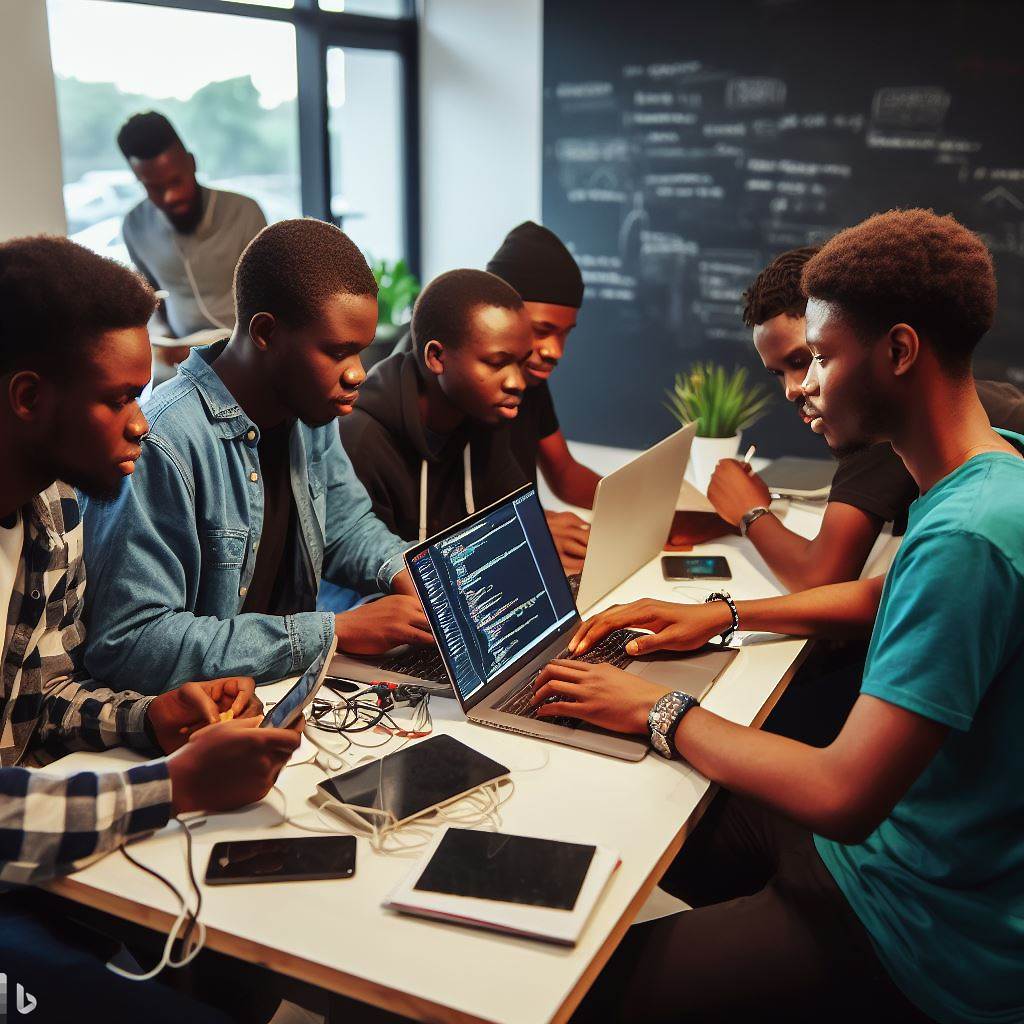Introduction
Completing projects after taking a coding course with Mosh is crucial to reinforcing coding skills.
Working on projects not only helps to solidify those skills but also allows for practical application and hands-on experience in real-life scenarios.
By taking on coding projects, students can put their newfound knowledge into action, further enhancing their understanding and mastery of the field.
The importance of working on projects to solidify coding skills
Projects act as a bridge between theoretical knowledge and practical implementation. They provide an opportunity for students to showcase their abilities, creativity, and problem-solving skills.
Working on projects also helps to develop critical thinking, logical reasoning, and time management abilities, which are essential for successful coding.
Additionally, completing projects after a coding course with Mosh offers a chance to expand one’s portfolio.
A varied and robust portfolio is highly valued in the tech industry as it demonstrates a candidate’s ability to apply coding concepts and solutions effectively.
Moreover, working on projects allows individuals to apply their skills to real-world problems, providing valuable experience that can be utilized in work settings.
This practical experience boosts confidence and prepares them for future coding challenges they may encounter in their careers.
Generally, taking on projects after completing a coding course with Mosh is essential for solidifying coding skills, gaining practical experience, and building an impressive portfolio.
It is through projects that individuals can showcase their abilities and apply their knowledge to real-life situations, ultimately becoming proficient coders.
Read: Learn Python Through Projects: Nigerian Real-World Examples
Benefits of Completing Projects after a Coding with Mosh Course
Completing projects after a Coding with Mosh course is highly beneficial for several reasons.
Not only do projects reinforce the concepts learned in the course, but they also provide invaluable hands-on experience in real-world coding scenarios.
Additionally, these projects offer a fantastic opportunity to showcase your skills to potential employers or clients.
Unlock Your Unique Tech Path
Get expert tech consulting tailored just for you. Receive personalized advice and solutions within 1-3 business days.
Get StartedReinforcing Concepts
Undertaking projects after completing a Coding with Mosh course allows you to apply the knowledge gained and reinforce the concepts learned during the course.
By putting these concepts into practice, you solidify your understanding and develop a deeper level of mastery.
Remember, practice makes perfect. By actively engaging with the material through projects, you further cement your understanding of fundamental coding principles and techniques.
Hands-on Experience
One of the most valuable benefits of completing projects is the hands-on experience they provide.
Throughout a Coding with Mosh course, you gain theoretical knowledge, but projects allow you to translate that knowledge into practical skills.
Real-world coding scenarios often present unique challenges that can only be fully appreciated through hands-on experience.
By working on projects, you develop problem-solving skills and become familiar with different coding scenarios, enabling you to tackle similar challenges in the future with confidence.
Showcase Skills
Projects provide an exceptional platform to showcase your skills to potential employers or clients. As you complete projects, you create a portfolio that demonstrates your capabilities and expertise in coding.
A strong portfolio sets you apart from other candidates, exhibiting your ability to apply your knowledge and produce tangible results.
When employers or clients can see your skills in action, they gain confidence in your abilities, increasing your chances of securing exciting career opportunities or lucrative contracts.
Confidence Boost
By successfully completing projects, you gain a significant confidence boost.
Each finished project serves as a testament to your progress as a coder and reinforces the fact that you can overcome challenges and produce meaningful results.
This increased confidence not only enhances your technical abilities but also empowers you to take on more complex coding projects in the future.
The more you challenge yourself and successfully complete projects, the more your confidence grows, fueling your passion for coding.
Unlock Premium Source Code for Your Projects!
Accelerate your development with our expert-crafted, reusable source code. Perfect for e-commerce, blogs, and portfolios. Study, modify, and build like a pro. Exclusive to Nigeria Coding Academy!
Get CodeSkill Development
Undertaking projects after a Coding with Mosh course helps you continue to develop and refine your coding skills. As you work on projects, you encounter new problems that require innovative solutions.
By solving these problems, you expand your skillset, pick up new techniques, and deepen your understanding of programming concepts.
This ongoing skill development is crucial for staying up-to-date in the fast-paced world of coding and ensuring continued professional growth.
In short, completing projects after a Coding with Mosh course offers numerous benefits.
From reinforcing concepts to gaining hands-on experience, showcasing your skills, boosting confidence, and fostering skill development, projects are an essential component of your coding journey.
So, make the most of the knowledge gained from the course and embark on exciting projects that will propel your coding skills to new heights!
Read: Learn HTML Through Projects: A Hands-On Approach
Criteria for Selecting Projects
Choosing appropriate projects after completing a Coding with Mosh course is crucial for continued skill development and personal growth.
It is essential to select projects that match your skill level and align with your interests and goals.
Importance of Choosing Appropriate Projects
Skill Level
One of the primary considerations when selecting projects is your skill level.
It is essential to choose projects that challenge you just enough without overwhelming you. This allows you to continue building on what you have learned and expand your knowledge further.
Interest
Selecting projects that align with your interests is vital.
When you work on projects you find exciting and enjoyable, you are more likely to stay motivated and engaged throughout the learning process.
Passion fuels creativity, making the learning experience more meaningful and productive.
Enhancing Learning and Motivation through Personal Goals
Alignment with Personal Goals
Choosing projects that align with your personal goals can significantly enhance your learning experience.
When your projects contribute to achieving your goals, it provides a sense of purpose and direction, keeping you focused and motivated.
This helps solidify and reinforce what you have learned in the Coding with Mosh course.
Continuous Learning
By selecting projects that push you slightly beyond your comfort zone, you embrace a growth mindset.
Taking on challenging projects helps you learn new concepts, explore different techniques, and develop problem-solving skills. This creates a continuous cycle of learning and growth.
Identifying Projects that Incorporate Learned Skills
Applying Course Knowledge
A great way to reinforce the skills learned in the Coding with Mosh course is by choosing projects that incorporate those skills.
Look for projects that require you to apply the coding languages, frameworks, and tools covered in the course.
This allows you to practice and solidify your understanding, ultimately boosting your confidence and proficiency.
Building a Portfolio
Consider selecting projects that can contribute to building a portfolio.
Having a diverse range of projects showcases your abilities to potential employers or clients.
It demonstrates that you can apply your skills to solve real-world problems and adds credibility to your resume or professional profile.
Collaborative Projects
Another option is to choose projects that involve collaboration with others.
This not only allows you to learn from different perspectives but also helps you develop essential teamwork and communication skills.
Collaborative projects simulate real-world work environments and prepare you for future professional collaborations.
Tips for Project Selection
- Reflect on Interests and Goals: Take the time to reflect on your interests and long-term goals. Consider how each potential project aligns with these aspects of your personal and professional life.
- Start Small: Begin with smaller projects that are within your capabilities. As you gain more experience and confidence, gradually take on more challenging projects.
- Research and Explore: Research diverse project ideas and draw inspiration from coding communities and online platforms to broaden your horizons and knowledge.
- Experiment and Innovate: Don’t hesitate to experiment with fresh ideas and techniques. Innovation often springs from unconventional thinking and boundary-pushing. Embrace creativity exploration.
- Time Management: Consider project completion time carefully. Be realistic about your availability and commitments to ensure adequate time and effort for your project.
Carefully select projects aligned with your skills and interests, incorporating Coding with Mosh’s teachings, to maximize your learning and growth.
Read: Data Structures & Algorithms: Coding with Mosh Review

Top 5 Projects to Consider after a Coding with Mosh Course
Building a Personal Portfolio Website
Having an online presence is crucial for showcasing your coding skills and creating a professional identity in the digital world.
In today’s tech-savvy era, it’s not just about what you know but also how effectively you can communicate and demonstrate your expertise. An online portfolio website is a powerful tool for achieving this.
Key Elements of a Portfolio Website
- Introduction: Start with a brief bio, your name, and a professional photo. A catchy tagline can also make a strong first impression.
- Projects Showcase: Highlight your coding projects with descriptions, images, and links to live demos or GitHub repositories. This provides tangible proof of your skills.
- Resume/CV: Include your education, work experience, and certifications. You can also list your coding skills and technologies you’re proficient in.
- Blog/Articles: Writing about coding-related topics demonstrates your knowledge and passion. It’s also a way to engage your audience.
- Contact Information: Make it easy for potential collaborators or employers to reach out to you.
Getting Started
Creating a portfolio website may sound daunting, but several resources can help:
- Website Builders: Platforms like WordPress, Wix, or Squarespace offer user-friendly templates for building your site.
- Domain and Hosting: Register a custom domain to give your website a professional touch. Services like GoDaddy or Bluehost can help with hosting.
- Coding Resources: If you’re into coding, you can build your website from scratch using HTML, CSS, and JavaScript. Platforms like GitHub Pages are also excellent for hosting your code-based portfolio.
- Content Creation Tools: Use tools like Canva for graphic design, Grammarly for content editing, and Unsplash for free high-quality images.
- Online Courses: Consider coding courses to enhance your skills, like Coding with Mosh’s courses.
Remember that your portfolio is an ongoing project.
Continuously update it with new projects, skills, and articles to keep it relevant and engaging. An online presence is your digital identity, so make it as impressive and professional as possible.
Creating a Web Application
Building a web application from the ground up is a rewarding experience for coders. It allows you to apply your skills and create something functional and valuable. Here’s an overview of the process:
Planning and Design
- Idea Generation: Start by brainstorming the purpose of your web app. What problem will it solve or what service will it provide?
- User Stories: Create user stories to define how users will interact with your app. What features will they use, and how will the app fulfil their needs?
- Wireframes and Mockups: Design the app’s layout, considering user interfaces and user experience. Tools like Figma or Adobe XD can help in creating mockups.
Choosing Technologies and Frameworks:
- Front-End: Select a front-end framework or library such as React, Angular, or Vue.js for building the user interface.
- Back-End: Choose a back-end technology like Node.js, Python (Django/Flask), or Ruby on Rails to handle server-side operations.
- Database: Opt for a database system, such as MySQL, PostgreSQL, or MongoDB, depending on your project’s needs.
Development
- Coding: Write code for the front-end and back-end components. Ensure functionality and usability while adhering to best practices and coding standards.
- Testing: Rigorously test your web app to identify and fix bugs and issues. Use testing frameworks like Jest for the front end and tools like Postman for API testing.
Deployment and Hosting
- Choose a Hosting Provider: Platforms like Heroku, AWS, or Netlify can host your web application.
- Set Up a Domain: Register a custom domain name to make your app more accessible.
Suggestions for Project Ideas
- Task Management System: Develop an application for creating, managing, and tracking tasks and to-do lists, enhancing productivity.
- Recipe App: Create a web app for sharing and exploring recipes. Include features like ingredient lists, cooking steps, and user reviews.
Building a web application is a fantastic way to showcase your coding skills, learn new technologies, and potentially solve real-world problems.
It’s a journey that combines your creativity, technical knowledge, and problem-solving skills to bring a digital concept to life.
Building a Mobile App
In today’s digital age, mobile apps have become an integral part of our lives. Their popularity continues to soar, offering a world of opportunities for developers.
Here, we delve into the possibilities and provide insights into creating your mobile apps.
The Rise of Mobile Apps
- Massive User Base: Billions of people worldwide use mobile apps daily, creating a vast audience for your creations.
- Diverse Needs: Apps cater to a myriad of needs, from communication to productivity, entertainment, and education.
- Monetization: Mobile apps offer various monetization avenues, from paid downloads and in-app purchases to ad revenue and subscription models.
Mobile App Development Platforms
- iOS (Apple): Swift and Objective-C are the primary languages. You’ll need a Mac and Xcode for development. Apple’s App Store is the distribution platform.
- Android (Google): Java and Kotlin are commonly used languages. Android Studio is the preferred development environment, and apps are distributed via Google Play.
- Cross-Platform Development: Tools like React Native, Flutter, or Xamarin allow you to write code once and deploy it on both iOS and Android, saving time and effort.
Project Ideas for Mobile Apps
- Weather App: Develop a weather application that provides real-time updates, forecasts, and severe weather alerts. Enhance user experience with interactive features and localized data.
- Language Learning Tool: Create an app that facilitates language learning through interactive lessons, quizzes, and pronunciation exercises. Incorporate gamification for engaging user experiences.
Building mobile apps opens doors to innovation, entrepreneurship, and connecting with a global audience. It’s an exciting journey to leverage your coding skills and create solutions that improve people’s lives.
So, dive into the world of mobile app development and unleash your creativity.
Developing a Simple Game
Game development is a captivating realm that marries art, technology, and storytelling.
In this segment, we embark on a journey into the enchanting world of game development, unveiling its allure and guiding you to create your own games.
The Magic of Game Development
- Creative Expression: Game development offers a unique canvas for creative minds to weave stories, design characters, and craft immersive worlds.
- Problem-Solving: Game developers tackle complex challenges, from coding intricate game mechanics to optimizing performance for a seamless gaming experience.
- Endless Diversity: Games span multiple genres, from action and adventure to puzzle, simulation, and role-playing, catering to a wide audience.
Game Development Engines and Frameworks
- Unity: A versatile engine used for creating 2D, 3D, augmented reality (AR), and virtual reality (VR) games. Its user-friendly interface simplifies development.
- Unreal Engine: Known for its stunning graphics and capabilities for creating high-end games, including virtual productions and architectural visualization.
- Godot: An open-source engine ideal for beginners, offering a visual scripting system that eases entry into game development.
Project Ideas for Game Development
- Maze Game: Craft a maze with twists and turns where the player navigates challenges to reach the goal. Implement logic to create an engaging puzzle.
- Memory Card Game: Develop a classic memory card game where players flip cards to find matching pairs. Enhance the game with various themes and difficulty levels.
Venturing into game development is an exciting path to unleash your creativity and technical skills. It’s a realm where you can build interactive stories, thrilling challenges, and captivating experiences.
So, step into this magical world and start crafting your games today.
Contributing to an Open Source Project
Contributing to open-source projects is not just about code; it’s a gateway to a world of benefits, learning, and collaboration.
In this section, we’ll explore why open source is invaluable and guide you on how to dive into the open-source community.
Real-World Experience and Collaboration
- Skill Enhancement: Open source projects provide real-world experience, refining your coding and problem-solving skills.
- Community Interaction: You’ll collaborate with like-minded developers, sharing knowledge and learning new tricks from seasoned contributors.
- Portfolio Enhancement: Open source contributions become significant additions to your portfolio, showcasing your coding prowess.
Finding Your Open Source Niche
- GitHub: Start your quest on platforms like GitHub, which hosts thousands of open-source projects spanning various domains.
- Language and Interest: Choose projects aligned with your interests and the programming language you’re comfortable with.
- Beginner-Friendly Labels: Some projects offer issues tagged as “beginner-friendly” to help newcomers get started.
Getting Started with Contributions
- Familiarize Yourself: Read project documentation and understand their guidelines and contribution process.
- Choosing Your First Issue: Pick a manageable issue and ask for clarification if needed. Then, submit your code and await feedback.
- Continuous Learning: Accept feedback gracefully and learn from your fellow contributors.
Impact and Recognition
- Potential Impact: Your contributions may enhance software used by thousands, or even millions, of users worldwide.
- Recognition: As you accumulate contributions, you gain recognition in the open-source community, which can lead to job opportunities and speaking engagements.
Open source is more than code; it’s a world of growth, learning, and a chance to create software that makes a difference. So, join the ranks of open-source contributors and experience the multifaceted benefits it offers.
Read: Coding Scholarships for Nigerian Students: What to Know
Delve into the Subject: Remote Coding Jobs: A Viable Option for Nigerians?
Conclusion
Working on projects after completing a Coding with Mosh course is crucial to solidifying and applying the newly acquired coding skills.
By engaging in hands-on projects, learners can reinforce their understanding of the course material and gain practical experience.
Choosing a project that aligns with one’s interests and goals is essential as it keeps the motivation high and ensures a fulfilling learning journey.
Moreover, projects provide an opportunity for continuous learning as they often require exploring new concepts and technologies.
Through project work, learners can further enhance their coding skills and discover innovative ways to solve real-world problems.
Additionally, projects serve as a tangible showcase of the skills and knowledge gained, which can impress potential employers or clients.
Therefore, it is important to embrace the challenge of a project and see it as a chance to grow and apply what has been learned.
Taking on projects after completing a Coding with Mosh course is essential for further skill development and practical application.
So, don’t hesitate to embark on a project that excites you and pushes you out of your comfort zone – the learning possibilities are endless!




